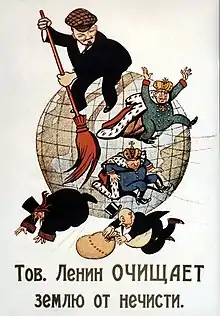Who, whom?
Who, whom? (Russian: кто кого?, kto kogo?; Russian pronunciation: [kto.kɐˈvo]) is a Bolshevist principle or slogan which was formulated by Lenin in 1921.

Lenin is supposed to have stated at the second All-Russian Congress of Political Education Departments, on 17 October 1921,
- Весь вопрос—кто кого опередит?
- "The whole question is—who will overtake whom?"
Leon Trotsky used the shortened "who whom" formulation in his 1925 article, "Towards Capitalism or Towards Socialism?"[1]
The shortened form was invoked by Joseph Stalin in 1929, in a speech to the Central Committee of the Communist Party of the Soviet Union, which also gave the formula its "aura of hard-line coercion" (while Lenin's phrase indicated a willingness to embrace economic competition):
- "The fact is, we live according to Lenin's formula: Kto–kogo?: will we knock them, the capitalists, flat and give them (as Lenin expresses it) the final, decisive battle, or will they knock us flat?"[2]
It came to be used as a formula describing the inevitability of class struggle, i.e. who (which of two antagonists) will dominate the other. In this view, all compromises and promises between enemies are just expedients – tactical manoeuvres in the struggle for mastery.[3][4]
See also
- Cui bono
- Charles de Gaulle, who said "France has no friends, only interests."
References
- Trotsky, Leon. "Towards Capitalism or Towards Socialism?". www.marxists.org. Retrieved 19 October 2015.
- Stalin, Sochineniia, (Moscow: Izdatel'stvo politicheskoi literatury, 1947–52), vol. xii, p. 37, see also vol. xii, p. 144. See "Soviet culture and foreign policy", Cambridge history of Russia, volume 3, p. 46. "Stalin presented the mass collectivisation of 1929–30 as the triumphal outcome of Lenin's kto–kogo scenario. Kto–kogo acquired its aura of hard-line coercion from Stalin's use of it during this period: 'we live by the formula of Lenin – kto–kogo: will we knock them, the capitalists, flat and give them (as Lenin expresses it) the final, decisive battle, or will they knock us flat?' Yet Stalin's claim to embody the original spirit of kto–kogo contains some paradoxes. Lenin and the Bolshevik leaders who picked up on his phrase had used kto–kogo to justify an economic competition with the Nepmen who dominated trade activities – a competition that would result in new forms of agricultural production only after an extremely high level of industrial technology was available. Stalin used kto–kogo to justify a policy of mass coercion against peasant kulaks to implement collective farms long before industry reached a high level."
- Daniel Bell (April 1958), "Ten Theories in Search of Reality: The Prediction of Soviet Behavior in the Social Sciences", World Politics, Cambridge University Press, 10 (3): 327–365, doi:10.2307/2009491, JSTOR 2009491,
Chapter: Kto-Kogo - The Id and Ego of Bolshevism
- Darko Suvin (2006), "Terms of power, today: an essay in political epistemology", Critical Quarterly, Blackwell Publishing Ltd, 48 (3): 38–62, doi:10.1111/j.1467-8705.2006.00720.x